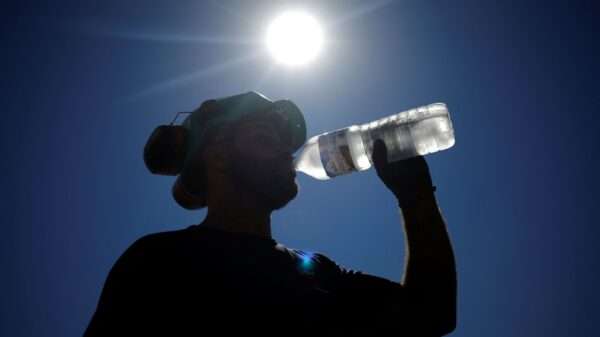After a wet and cold start to spring, the UK is finally set for some warmer days ahead.
Higher temperatures seem to be on the way, with peaks of 19C (66F) predicted in some parts of the UK this weekend.
But how long will it last?
The UK looks set to see temperatures consistently above 16C (60F) until the end of May in some parts – with highs of 21C (69F).
It’s also expected that there will be above-average temperatures for the start of June.
But with reports swirling of heatwaves on the horizon, the Met Office urges caution.
A spokesperson for the Met Office told Sky News: “As always with a longer-range forecast, there is always some uncertainty.”
For this month, the weather agency said: “There is a higher than normal chance of warmer temperatures, however near average or cool conditions remain possible.”
But the cold snaps aren’t over…
While the daytime temperatures may offer hope on some days, there will still be chilly evenings and even some ice.
Sky News weather presenter Jo Wheeler said we might encounter “rural frosts” this week.
She added: “The Met Office says that there is no signal of a heatwave in the forecast so far.
“We’re currently experiencing ‘lower than usual’ temperatures thanks to high-pressure building in the west, which is bringing a cool northerly flow.
“In fact, this week, many parts of the country are likely to experience overnight rural frosts – despite our being in mid-May!”
“It looks as if the ‘Azores High’ remains close to the UK in some format or another until the end of the month. With its position shifting a little over time, the wind direction will also change which will directly impact temperatures, giving fluctuations both above and below average values,” she said.
What will the summer be like?
For June and July, the chance of it being hot is “higher than normal”, the Met Office says, but adds that “near average temperatures remain the most likely outcome”.
“The increased chance of warm conditions through the period is consistent with our warming climate,” the spokesperson added.
“Whilst this doesn’t necessarily mean a heatwave will occur, it does increase the likelihood of this compared to normal.”
On the months ahead, Sky’s Jo Wheeler added: “It does look as though El Nino will become established this year, but that would be more likely to result in high temperatures for 2024, rather than 2023.”
An El Nino is declared when sea temperatures – in the tropical eastern Pacific – rise 0.5C above the long-term average.
El Nino is part of a natural cycle that usually occurs every three to seven years and could last for several months at a time.
The strongest El Nino episodes were in 1997 to 1998 and 2015 to 2016.
Earlier this month, the United Nations warned that higher global temperatures and possibly new heat records could be seen due to climate change.
Wilfran Moufouma Okia, head of the UN’s World Meteorological Organisation (WMO), said there was no current estimate of the impact El Nino will have on temperatures.
“El Nino will fuel the temperature globally,” he said.
“We feel the effect of El Nino temperatures globally with a slight delay.”
2022 v 2023
Last year, the UK recorded temperatures above 40C (104F) for the first time ever, with much of England being put under the Met Office’s first-ever red warning.
The heatwave triggered a major incident in London due to a “high surge” of fires.
Drought was also officially declared in some parts of England, including Bristol, Somerset, Dorset, South Gloucestershire and parts of Wiltshire.
Jo Wheeler said when the UK experiences a heatwave, its warmth is usually from Northern Africa or the Iberian peninsula.
“When the UK and Ireland do experience a heatwave,” she said, “we often find the source of the warmth to be Northern Africa or Iberia.
“Those areas have certainly experienced extreme heat recently, but that failed to impact us in any way, shape or form.”
It’s not expected that 2023 will see more 40C days, as scientists expect these to be extremely rare events.








































